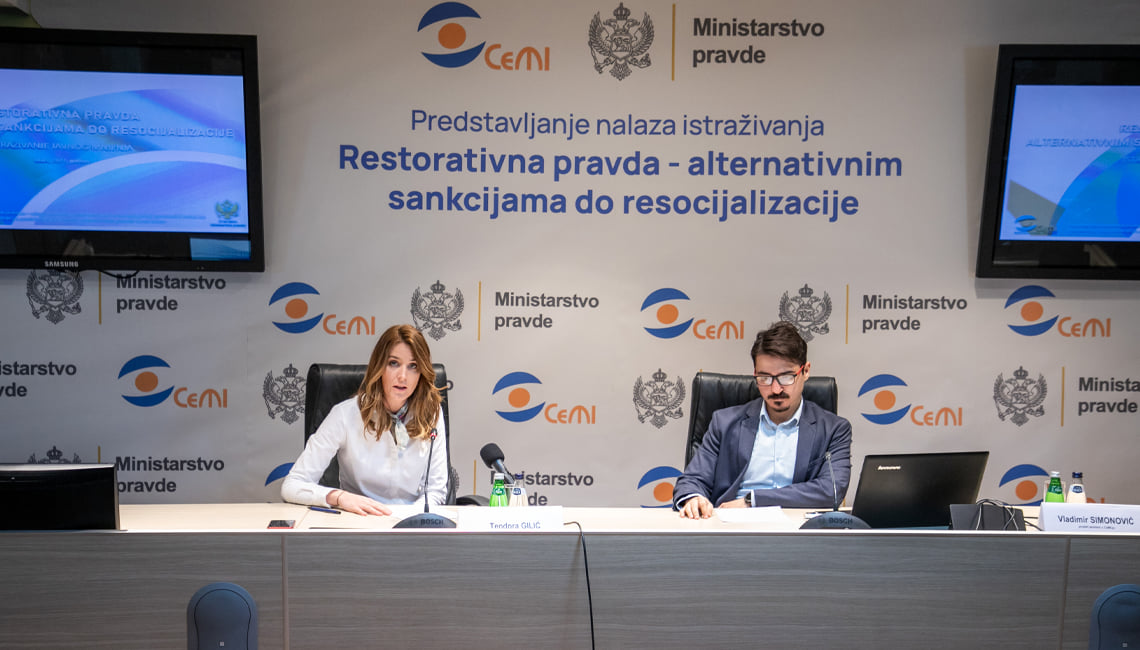Almost two-thirds of Montenegrin citizens believe that the existing penal system is insufficiently successful in reducing crime, and they see fines as the most effective alternative sanction, according to a survey by the Center for Monitoring and Research (CeMI).
The research "Restorative justice - alternative sanctions to resocialization" was conducted on a sample of 1,117 adult citizens of Montenegro in the period from February 24th to 28th this year.
Project assistant at CeMI, Vladimir Simonovic, said today, at the press conference, that the survey showed that one third of citizens consider the penal system successful.
"Opinions are divided on the question of the function of punishment. Slightly more than half of citizens believe that the primary function of punishment is preventive. On the other hand, two-fifths of citizens find that punishment has primarily a repressive purpose," said Simonovic.
According to him, although three fifths of citizens know someone who has been convicted, the concept of alternative sanctions is unknown to the majority of citizens.
"More precisely, two-thirds of citizens state that they have not heard of alternative sanctions." However, the problem is more of a terminological nature than an essential one, because although the majority of citizens have not heard of the concept of alternative sanctions, the vast majority recognize all the offered punitive measures. In this sense, almost all citizens state that they have heard of fines, and about 90 percent recognize the measures of house arrest, conditional sentences and court warnings," said Simonovic.
He said that a little less recognition occurs only when it comes to work in the public interest and parole, which 17 percent and 18 percent of citizens who have not heard of alternative sanctions do not know about.
"On the other hand, citizens who know about alternative sanctions, most often associate this term with community service and house arrest." These two types of sanctions are mentioned by two fifths, that is, one third of the more informed citizens. In addition, a certain number of citizens include fines and suspended sentences as alternative sanctions. However, almost every fifth citizen who states that they have heard of the term, does not specify the type of sanction they know about," said Simonovic.
Although opinion is divided, a positive attitude towards the application of alternative sanctions prevails.
"In other words, while half support them, two-fifths take the opposite view. When it comes to the effectiveness of alternative sanctions, the largest number of citizens believe that a fine is the most effective alternative sanction (44 percent), while a quarter in this sense emphasizes work in the public interest, and 10 percent mention house arrest," said Simonovic.
Judging by the opinion of the majority of citizens, as he stated, prison sentences are more effective than alternative measures.
"As many as seven out of ten citizens believe that prison sentences have a greater impact on the perpetrator of the crime, while a fifth of citizens prefer alternative sanctions." As the most effective, the citizens of Montenegro emphasize prison and fine punishment, while the opposite is true for a court warning. Three quarters of citizens believe that imprisonment and fines are effective. "Also, half of the citizens see work in the public interest as effective," Simonovic said.
As the majority of citizens suggest, Montenegrin courts prescribe insufficient prison sentences.
"This opinion is represented by two-fifths of citizens, while 12 percent think the opposite - that prison sentences are prescribed too much, while one-third of citizens rate the prescribing of prison sentences as optimal. When asked to what extent the courts impose alternative sanctions, almost a third of citizens believe that alternative sanctions they prescribe too little, and almost a fifth think the opposite. "Between these two positions are 35 percent of citizens who consider the prescribing of alternative punishments optimal," said Simonovic.
The CEO of CeMI, Teodora Gilic, said that the project "Restorative justice - alternative sanctions to resocialization" was implemented by the organization in previous years with the financial support of the former Ministry of Justice of Montenegro.
"With this project, CeMI is committed to strengthening the rule of law in Montenegro, with a special focus on the protection of human rights and freedoms." The goal of the project is to contribute to the improvement and promotion of the system of alternative sanctions, in accordance with the standards of the European Union and the best international practice," Gilic stated.
She pointed out that CeMI conducted qualitative and quantitative research as part of this project.
"Qualitative research was conducted through interviews with legal experts, as well as with representatives of legal entities, organizations and institutions where the punishment of public interest work is carried out. The results of this research are an integral part of the analysis that CeMI will present at the national conference, which will be held on Wednesday," Gilic explained.



